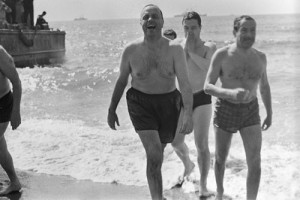
The last time the conservative Partido Popular (PP) was governing Spain, the satirical television show Los Guiñoles was still being broadcast, with its latex puppets lampooning the country’s public figures. One of its most memorable targets was Manuel Fraga, even then a decidedly long-in-the-tooth politician, who on at least one occasion was portrayed as a dinosaur, complete with scaly tail and brontosaurus-style limbs.
This image was fuelled by the fact that Fraga was still, in his eighties, the premier of Galicia, a position he held between 1990 and 2005. Also, perhaps most famously, he had been a minister under Franco.
But it’s clear that there was more to Fraga, who died on Sunday at the age of 89, than his longevity and prominent position in the dictatorship. His style certainly wasn’t to the taste of many Spaniards, particularly regional nationalists and those on the left, but he nonetheless won the respect of many who were essentially his enemies.
“He was very much of the right, very authoritarian and very stubborn in his ideas and attitudes,” said Santiago Carrillo, the communist leader who was both a political rival of Fraga and a key colleague of his in the post-dictatorship transition. Carrillo’s complex view of the man epitomises how difficult it was to simply pin down Fraga as a two-dimensional right-winger. “He had a talent for adapting to the times,” Carrillo added.
That ability to move with the times made him a unique figure in Spanish politics: one who was both influential during the dark days of Franco and yet who later was comfortable as he watched – and even helped – the country speed into the late 20th century.
Fraga’s top-tier political career began when he joined Franco’s government in the early 1950s. As minister of tourism he encouraged the country to open up to foreigners and many credit him with helping sweep away the prudishness associated with the regime. Con Fraga, hasta la braga (“With Fraga, down to your underpants”) was one refrain of the time, “Spain is different” was another, and one which for which the minister himself was credited.
In perhaps his most famous moment, Fraga got down to his own underpants when he went swimming off the Mediterranean coast in 1966 in a bid to show the media and the Spanish people that the water was healthy despite an air accident in the area involving nuclear warheads.
When Franco died in 1975, instead of quietly disappearing from the political scene like many of his colleagues, Fraga became a key figure in the transition and the founder of the Alianza Popular, the precursor to the Partido Popular.
While he never rose to prime minister, the job he coveted most, he did see one of his protégés, José María Aznar, reach the post in 1996. Though his own legacy was already largely sealed, critics would gather plenty of ammunition in the following decade-and-a-half as they observed Fraga’s premiership of Galicia. For them, this supposedly forward-looking politician was decidedly feudal in the way he managed the region, overseeing a highly personalised political network.
“One cannot choose the period of history in which one lives,” Fraga once said, in response to being asked about his involvement in the Franco regime.
That may be true, but a man whose political career lasted the best part of 60 years could hardly have asked for a more extraordinary period to witness – and be a key part of.
Leave a Reply
You must be logged in to post a comment.